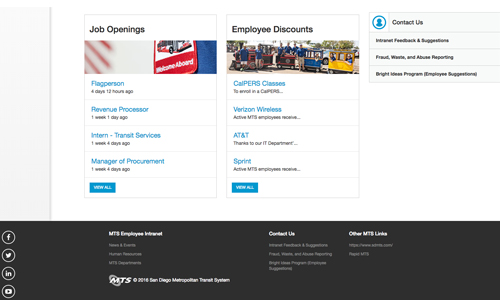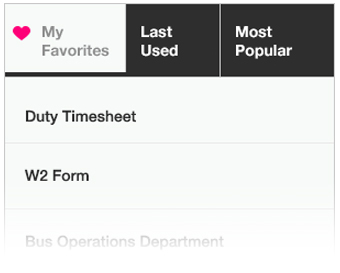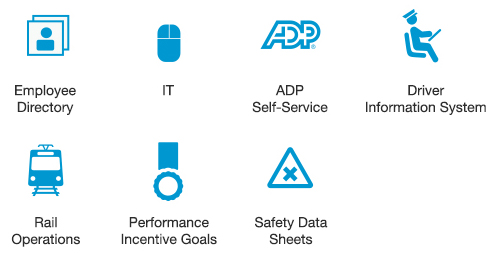You are here
Making Every Trip Special: MTS Access Part 2 of 2
There are 169 MTS Access paratransit buses that work out of the Copley Park Division and each one plays an important role to help San Diego residents with disabilities get to vital health appointments. Sometimes just as important, it also helps them do everyday things.
“The service provided by MTS Access recognizes that residents with disabilities are equal and important members of our community,” said DeRees Clark, the General Manager of MTS’ Copley Park Division. “It’s not just about taking people to doctor’s appointments or to kidney dialysis. Trips to the nail salon or baseball games are also important. These are places everyone wants to go whether they have a disability or not and our mission is to make sure all residents have equal access to all the wonderful things San Diego has to offer.”
MTS Access is an appointment-based bus service for those who have been certified as unable to use the fixed-route service. Home pick-ups are common and each bus has a sophisticated wheelchair lift system designed to raise and lower a passenger with a wheelchair to enter and exit a vehicle.
About 25% of Access passengers use a wheelchair or similar mobility device.
The team behind the wheel of our Access buses is a company called First Transit. MTS and First Transit have worked together for many years. MTS owns all the equipment and vehicles, and First Transit employees run the operation out of the Copley Park Division in Kearny Mesa. This is where all of our Access and our fleet of 37 additional fixed-route buses – called minibuses – are housed.
“We have a great partnership with MTS,” added Clark. “One of the benefits is that MTS is always giving us new and modern tools to help us do the job better.”
This stems from MTS’ philosophy with all its contractors. “We want to mirror the level of service between in-house operations and contract services,” said Jay Washburn, MTS Manager of Minibus and Paratransit. “First Transit employees wear MTS uniforms and drive MTS vehicles. Passengers don’t see a difference. The experience is equitable regardless of who is driving the bus.”
Another shared philosophy First Transit has with MTS is prioritizing safety. “I started in October 2017 and one of the things that stood out when I arrived was the culture of safety already in place,” added Clark. “It’s mandatory for all operators to wear fluorescent safety vests around the yard. I’ve never had to say to someone, ‘where is your vest?’ It’s second nature around here.”
A recent safety upgrade MTS made was installing back-up cameras on all Access vehicles to help operators better-handle the narrow streets and neighborhood driving that goes along with the curb-to-curb service. “We haven’t had a backing up accident on a bus with these new cameras since they were installed,” said, Assistant General Manager Rafael Villegas, who has worked for First Transit at the Copley Park Division for 18 years.
Back-up cameras benefit MTS Access because unlike standard fixed-route buses, MTS Access vehicles have to be nimble for navigating u-turns and cul-de-sacs. This is something operators are always thinking about.
“We have to find places to park, and ensure the wheelchair lift can be deployed safely. Even before I get to the pick-up location I’m already thinking about how I need to maneuver around the area,” said Tasha Hall, an MTS Access operator who’s been with First Transit for one year.
In addition to the pick-up locations, operators have to understand the rider demographic and the challenges they could be faced with. Sensitivity training is prioritized.
“You have to understand how to encourage the passenger when boarding without pushing them,” said Tasha Hall.
“Some passengers thrive on the independence of putting on their own seatbelt. They may not want help but the operators must still verify they are properly secured.”
Each passenger’s disability is unique, so First Transit uses a sophisticated scheduling system that comprehends the needs of the passenger, the type of mobility device they use (wheelchair vs. scooter), and when the passenger should be picked up. It’s a puzzle of picking up passengers in a specific order and strategically placing them inside the bus. If a passenger is not in the right spot, the operator may need to unnecessarily de-board other passengers to get the correct passenger out – costing extra time and efficiency.
Access operators participate in mandatory training of 30+ classroom hours, 36 hours behind the wheel, and 4-5 days in revenue service. “One of the most important parts of training is wheelchair securement,” said First Transit Safety Training Supervisor Mica Ruiz. “We make the trainees try different loading situations such as uphill, downhill, on a curb and no curb. It’s all different and they have to get it right.”
Getting it right is also important to the maintenance side of the operation. There’s different equipment on the Access buses than the fixed-route buses and it is important that all equipment is properly maintained.
To handle the job, First Transit employs a nationally recognized maintenance division. It’s a team that has achieved Blue Shield Certification – a national certification that requires intensive training and on-the-job certifications. It’s a dedicated group that has 158 years of experience between 18 mechanics.
“The garage never closes,” said Don West, a mechanic for First Transit for 18 years and the shift lead for the 2 a.m. – 10:30 a.m. crew.
West’s shift is responsible for ensuring any mechanical issues get fixed quickly for the morning rush – including broken headlights or taillights, the wheelchair lift not functioning properly – or smaller “buggy” problems that come up during the operator’s pre-roll-out inspection.
West said the biggest learning curves for maintenance are fueling and technology. “We’ve handled diesel, CNG, and now propane fuel. Since propane is new, there’s some on-the-job education that takes place. Additionally, computer diagnostics have become a bigger part of the inspection process. As the technology becomes more clean and efficient, we adapt to it.”
Adapting to the job is something that all MTS employees have to do. In our industry, every day is different. And this holds true at the Copley Park Division which handled 1.2 million passenger trips in FY 2018. Approximately 500,000 of those trips were by Access. MTS Access is also about providing residents independence and helping them thrive in the community.
Photo from left to right: Safety Manager Lisa Prince, General Manager DeRees Clark, Road Supervisor James Murphy, Operations Manager Bill Kiehl, Road Supervisor Ronald Young, Assistant General Manager Rafael Villegas, Lead Mechanic Don West, and Bus Operator Tasha Hall

 Employee Directory
Employee Directory IT Help Desk
IT Help Desk ADP Self-Service
ADP Self-Service Driver Information System
Driver Information System Bus Operations
Bus Operations Rail Operations
Rail Operations Performance Incentive Program
Performance Incentive Program Safety Data Sheets
Safety Data Sheets




